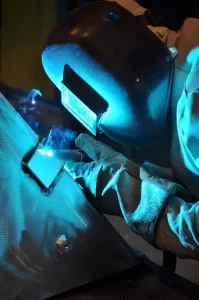Beryllium (Element)
What Is Beryllium?
Beryllium (or BE on the periodic table of elements) is an alkaline-earth metal extracted and used as a hardening agent in outer space and nuclear operations and for gears and cogs in many other sectors. It is a silvery-white metal that somewhat resembles aluminum; however, it is not found by itself in nature but extracted from minerals such as beryl and emerald.
As part of these minerals, beryllium is found in much of the earth’s crust and indigenous rocks.
The USA produces around 60% of the world’s beryllium supply in its commercial applications, but China, Mozambique, and Brazil also produce large amounts.
What Is Beryllium Used For?
For everyday use, welders use beryllium with copper or nickel to make:
- Springs
- Electrical contacts
- Spot-welding electrodes
- Gyroscopes
- Computer parts
Because of its high melting point, beryllium is uniquely suited for nuclear applications, and its ability to conduct heat without sparking means aviation engineers work with beryllium to make:
- Missiles
- Spacecrafts
- High-speed aircrafts
- Communication satellites
- Nuclear reactors
- Heavy-duty brake drums
Health Effects of Beryllium
While extremely useful, the CDC has labeled beryllium and its compounds carcinogenic toxins. Beryllium is so dangerous that the effects of inhaling its dust or fumes cause its own kind of metal poisoning termed berylliosis. Anyone who works in an environment with the potential for airborne beryllium in even small amounts is at risk.
Berylliosis causes severe lung inflation and can be acute or chronic. Acute berylliosis has symptoms including:
- Coughing
- Difficulty breathing
- Sore throat
- Swelling of the mucus membrane
Luckily, acute berylliosis can be cured but is life-threatening if not treated immediately.
On the other hand, prolonged exposure can lead to chronic berylliosis–desensitization which causes lifelong, progressively worse symptoms that can leave you with permanently damaged lungs, and difficulty breathing even during the most basic daily activities.
How to Properly Dispose of Beryllium
Many people do vital work with beryllium, so how can you make sure you’re keeping yourself and others safe from berylliosis if you work with the compound? The most important step you can take is to make sure you dispose of beryllium scraps properly. By doing so, you will not only protect yourself from exposure but anyone else who may come into contact with the waste.
The WHO recommends recycling beryllium whenever possible by placing it in a clearly labeled sealed bag or container. However, when it comes to e-waste recycling, dropping off that container yourself may not be enough to ensure safety. Instead of risking lives by taking beryllium scraps to a facility that incinerates waste, you should utilize a responsible e-waste recycling center like Newtech Recycling.
Newtech Recycling provides any service you might need to help with e-waste or computer recycling. As well as on-site pick-up and recycling services, Newtech Recycling offers corporate packages for companies that have large amounts of electronics.
If you have beryllium or products with beryllium that need disposal and are in our service area, contact Newtech Recycling today, and never have to worry about transporting or recycling your beryllium again.


